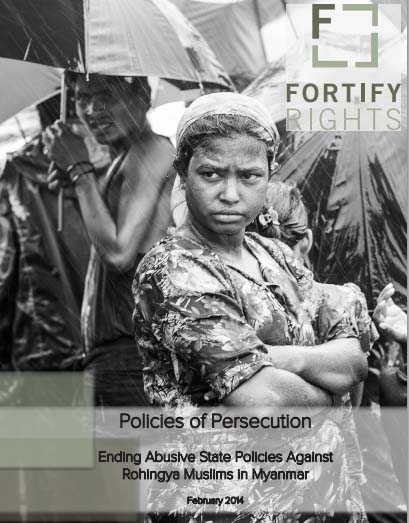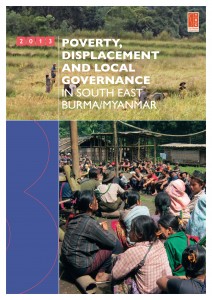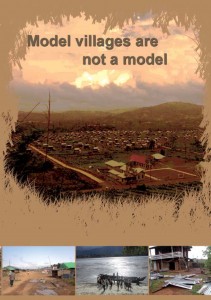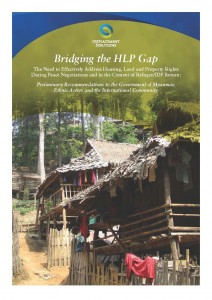Displacement (184 found)
Refugees on the Thai-Burma border: ready for return?
At the current time, talk of any kind of imminent return for refugees in camps on the Thailand Burma border is not only premature, it is also cruel and unfair, as it adds further stress and uncertainty to the lives of refugees who have already suffered so much. Current peace process I can’t call […]
• •Myanmar: Act Immediately to Protect Displaced People’s Rights
As Myanmar continues its renewed engagement with the international community, it must begin to address the serious violations of the rights of ethnic minorities that plague the country. Nearly two years after violence erupted in June 2012, almost 140,000 Muslims (primarily Rohingyas) remain displaced in Rakhine State in conditions of total segregation and marginalization from the Rakhine Buddhist majority. Like the hundreds of thousands of non-displaced Rohingyas in northern Rakhine State, they remain subject to extremely abusive restrictions on their freedom and exposed to violent attacks[…]
• • •MYANMAR: ABOLISH ABUSIVE RESTRICTIONS & PRACTICES AGAINST ROHINGYA MUSLIMS
 The 79-page report, Policies of Persecution: Ending Abusive State Policies Against Rohingya Muslims in Myanmar, produced by Fortify Rights is based primarily on the analysis of 12 leaked official documents and a review of public records, as well as interviews with Rohingya and others in Myanmar and Thailand. The documents published in the report reveal restrictions that deny Rohingya basic human rights, including the rights to nondiscrimination, freedom of movement, marriage, family, health, and privacy. All of the restrictions and enforcement methods described in the report appear to be in effect at the time of writing.
The 79-page report, Policies of Persecution: Ending Abusive State Policies Against Rohingya Muslims in Myanmar, produced by Fortify Rights is based primarily on the analysis of 12 leaked official documents and a review of public records, as well as interviews with Rohingya and others in Myanmar and Thailand. The documents published in the report reveal restrictions that deny Rohingya basic human rights, including the rights to nondiscrimination, freedom of movement, marriage, family, health, and privacy. All of the restrictions and enforcement methods described in the report appear to be in effect at the time of writing.
“Regional Order 1/2005,” obtained by Fortify Rights, lays the foundation for a two-child policy enforced in Maungdaw and Buthidaung townships, requiring Rohingya “who have permission to marry” to “limit the number of children, in order to control the birth rate so that there is enough food and shelter.” This order—which in practice translates to a strict two-child policy— also prohibits Rohingya from having children out of wedlock […]
• • •Poverty, Displacement and Local Governance in South East Burma/Myanmar
 As the pace of reform has slowed in Burma/Myanmar during 2013, the potential for an inclusive political dialogue process to address the causes of conflict has increased. The sustainability of national reconciliation will require sensitivity to the concerns and aspirations of ethnic nationality communities in relation to identity, security and justice. This village-level survey describes the challenge of addressing chronic poverty, protracted displacement and weak governance at the community level in South East Myanmar as part of the conflict transformation process […]
As the pace of reform has slowed in Burma/Myanmar during 2013, the potential for an inclusive political dialogue process to address the causes of conflict has increased. The sustainability of national reconciliation will require sensitivity to the concerns and aspirations of ethnic nationality communities in relation to identity, security and justice. This village-level survey describes the challenge of addressing chronic poverty, protracted displacement and weak governance at the community level in South East Myanmar as part of the conflict transformation process […]
Model Villages Are Not a Model
 This short report by Mungchying Rawt Jat (MRJ) documents cases of farmers who have been forcibly relocated to make way for “development” projects in Kachin State, and are now staying in Sanpya camp in Hugawng Valley, and Aung Myin Thar and Maliyang camps near the Irrawaddy Myitsone.
This short report by Mungchying Rawt Jat (MRJ) documents cases of farmers who have been forcibly relocated to make way for “development” projects in Kachin State, and are now staying in Sanpya camp in Hugawng Valley, and Aung Myin Thar and Maliyang camps near the Irrawaddy Myitsone.
Bridging the Housing Land and Property Gap
 Of the many challenging issues that will require resolution within the peace processes currently underway between the government of Myanmar and various ethnic groups in the country, few will be as complex, sensitive and yet vital than the issues comprising housing, land and property (HLP) rights. Viewed in terms of the rights of the sizable internally displaced person (IDP) and refugee populations who will be affected by the eventual peace agreements, and within the broader political reform process, HLP rights will need to form a key part of all of the ongoing moves to secure a sustainable peace, and be a key ingredient within all activities dedicated to ending displacement in Myanmar today […]
Of the many challenging issues that will require resolution within the peace processes currently underway between the government of Myanmar and various ethnic groups in the country, few will be as complex, sensitive and yet vital than the issues comprising housing, land and property (HLP) rights. Viewed in terms of the rights of the sizable internally displaced person (IDP) and refugee populations who will be affected by the eventual peace agreements, and within the broader political reform process, HLP rights will need to form a key part of all of the ongoing moves to secure a sustainable peace, and be a key ingredient within all activities dedicated to ending displacement in Myanmar today […]
State Terror in the Kachin Hills
In late 2012, the Burma Army intensified military operations against strongholds of the Kachin Independence Army (KIA). This culminated in a massive offensive on the KIA headquarters at Laiza on the China-Burma border starting in mid-December […]
• • •Visit to Kachin IDP camps: 7 to 24 February 2013
Since the beginning of fighting in Kachin State on June 9th 2011, the Kachin Relief Fund (KRF) has been providing aid direct to IDPs with local actors. The KRF is fulfilling the major gaps using supporters’ donations, while international agencies have been preoccupied with their inability to operate freely in the KIO administrative areas.
The KRF has identified many needy spaces not been covered by the UN relief agencies or the DFID’s funded projects […]
• • •Position on the Repatriation of Refugees from Burma
After the Karenni Refugee Committee (KnRC) organized three workshops on September 20-21st, November 9th and October 8-10th, attended by representatives of KnRC, Karenni community based organizations and religious leaders, the groups agreed on a common position paper on refugees’ repatriation as follow […]
• • •The Situation of Refugees on the Thai-Burma Border
This briefing paper looks at the current situation in Burma’s ethnic areas, the areas that refugees would be returned to, and shows how the conditions are not yet in place for their return. Furthermore, it highlights the need for the refugees to be included in these processes and lays out refugees and community-based organization’s preconditions for their return […]
• • •
 All posts
All posts